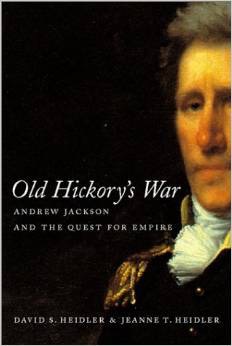In the years following the War of 1812, Battle of New Orleans hero General Andrew Jackson became a power unto himself. He had earlier gained national acclaim and a military promotion upon successfully leading the West Tennessee militia in the Creek War of 1813–1814, Jackson furthered his fame in the First Seminole War in 1818, which led to his invasion of Spanish West Florida without presidential or congressional authorization and to the execution of two British subjects. In Old Hickory’s War, David and Jeanne Heidler present an iconoclastic interpretation of the political, military, and ethnic complexities of Jackson’s involvement in those two historic episodes. Their exciting narrative shows how the general’s unpredictable behavior and determination to achieve his goals, combined with a timid administration headed by James Monroe, brought the United States to the brink of an international crisis in 1818 and sparked the longest congressional debate of the period.
"A vivid description of little-known details of the period.” —Journal of the Early Republic
“Heidler and Heidler tell the story in great detail, and they tell it well.” —Journal of American History
Excerpt
From the conspirators' den to the campaign stump to the dueling field, Jackson moved as a tempest, a force capable of killing everything but the odious talk and the vicious rumors. All of it, after all, was sprinkled with fine, ghastly grains of truth. In spite of defenses mounted and explanations made by admirers then and since, nothing can alter the evidence that Andrew Jackson was an angry young man who became an angry old man. He might have contrived for effect the rages that peppered his life, as some suggest, but the quieter tantrums sprang from his insides and sculpted his defining, exterior character. His mother had died of cholera during the American Revolution, making young Andy an orphan at fourteen. As far as he could reckon, the British had done that, had created the hardships of pestilence and destruction that killed his mother, his brothers, and the gentler edges of his nature. He had been duped into Aaron Burr's half-baked plot because he detested swaggering Spaniards—"greasers" as Jackson called them—whose contempt for the United States Jackson brooded over and fulminated against. He would destroy them and any of their friends. He would take their land, dash the standards of His Most Catholic Majesty to the ground, crush the British Lion and Unicorn; he would stand before their red allies as he had before young Dickinson, even after taking the bullet, his absurdly narrow shoulders drawn back, his long head tilted down to stress the snarl, to shade his blue eyes from the sun. He would carefully draw aim. He would kill them all.
From Old Hickory’s War: Andrew Jackson and the Quest for Empire (1996)
